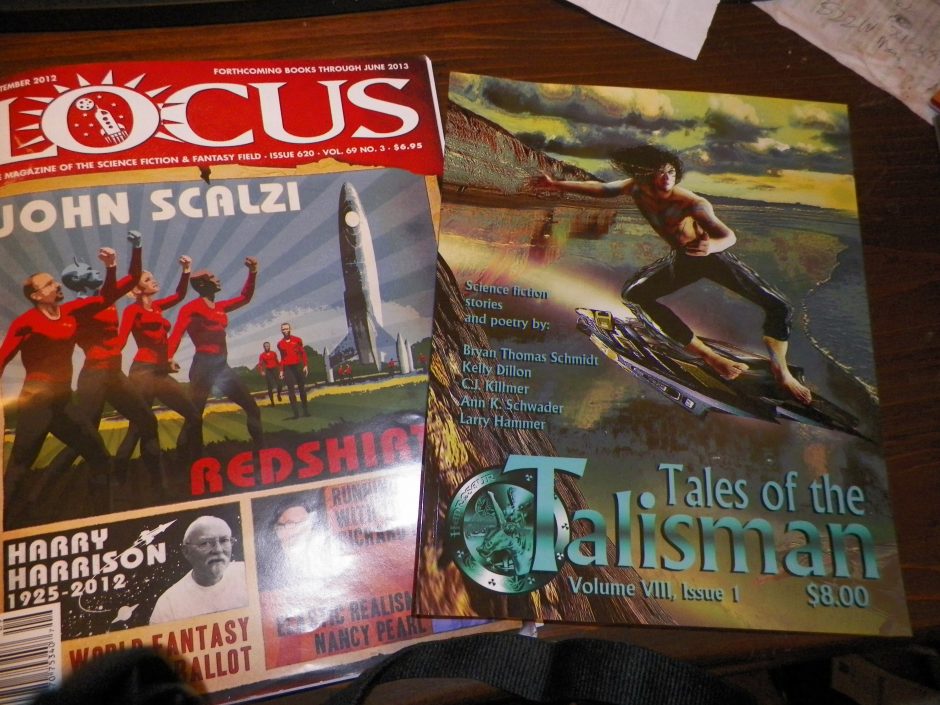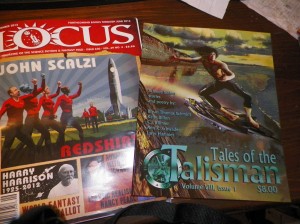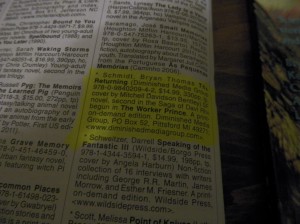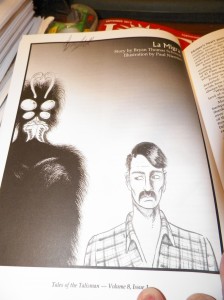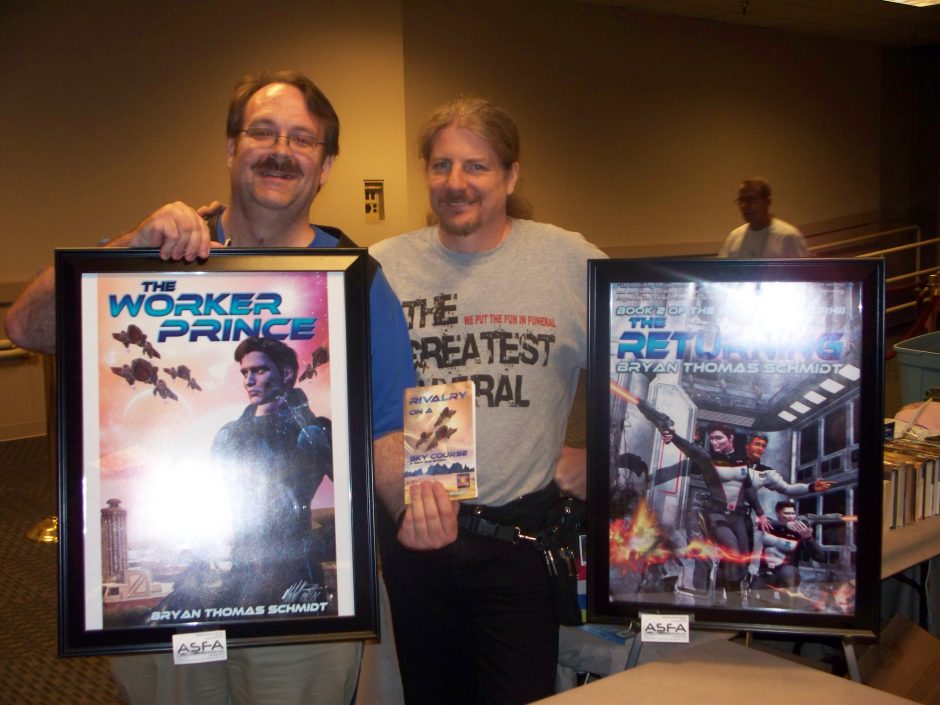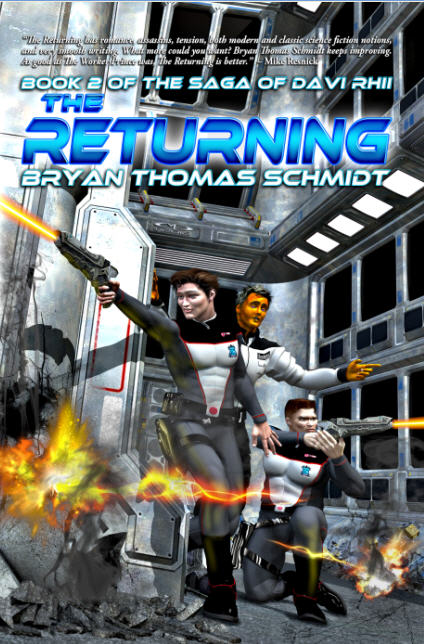Comic Con asked me to moderate a publishing panel for the online version of the Con this year. So I got on Zoom with 5 bestselling authors to talk about THE FOUR QUADRANTS OF PUBLISHING: The Big Fix/Six, Traditional Small Press, Print on Demand/Ebook Press, and Self-Publishing and the Pros and Cons of each. The ensuing discussion should be useful as you consider the career you want to pursue. Enjoy free below!
Tag: Publishing
Introducing Boralis Books, a new small press
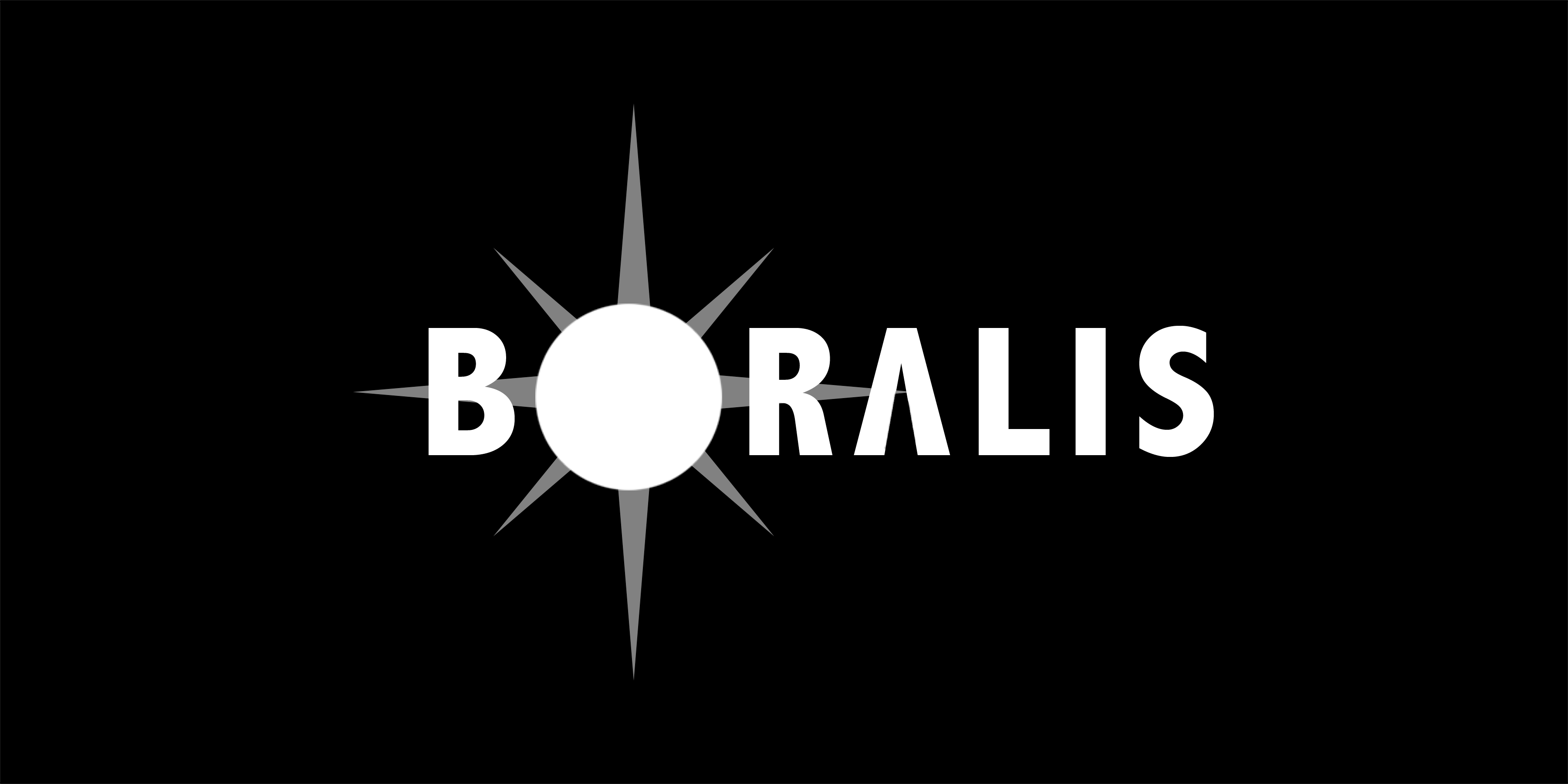 Some of you know I’ve been working on a new project with friends called Boralis Books. Boralis Books arose out of my frustration with New York publishing rejecting strong, well written page turners because they “didn’t know how to market them.” It’s happened to me several times and I know other authors have experienced the same frustration. So I decided to publish some novels myself, and to me, the best way to do it is to create a press and recruit staff—editors, proofers, designers—and try and put out quality product that rivals New York quality books.
Some of you know I’ve been working on a new project with friends called Boralis Books. Boralis Books arose out of my frustration with New York publishing rejecting strong, well written page turners because they “didn’t know how to market them.” It’s happened to me several times and I know other authors have experienced the same frustration. So I decided to publish some novels myself, and to me, the best way to do it is to create a press and recruit staff—editors, proofers, designers—and try and put out quality product that rivals New York quality books.
Eventually, Boralis Books will release titles by multiple authors: novels, anthologies, collections, maybe a few novellas too. But for now, it is starting with three near future procedural thrillers by me. Every project will depend upon the success of prior projects for funding, so the initial plan is to release three books a year, one every four months, and see how it goes. Books will be released in hardcover, trade paperback, and ebooks—with audio to come as available. All books will be distributed via Ingram Sparks so bookstores anywhere can stock them if they desire, with ebooks initially exclusive to Kindle and then expanding from time to time to other mediums. We will, of course, also set up a Boralis Books store for selling the other formats as soon as we can.
For information on what we have so far, please check out Boralis Books at www.boralisbooks.com, a work in progress for sure. As more authors and projects are chosen, we will post information there. We will not be doing open submissions at least initially. I don’t have the time or resources to review them adequately and keep up with other plans. But we leave open that option for down the road.
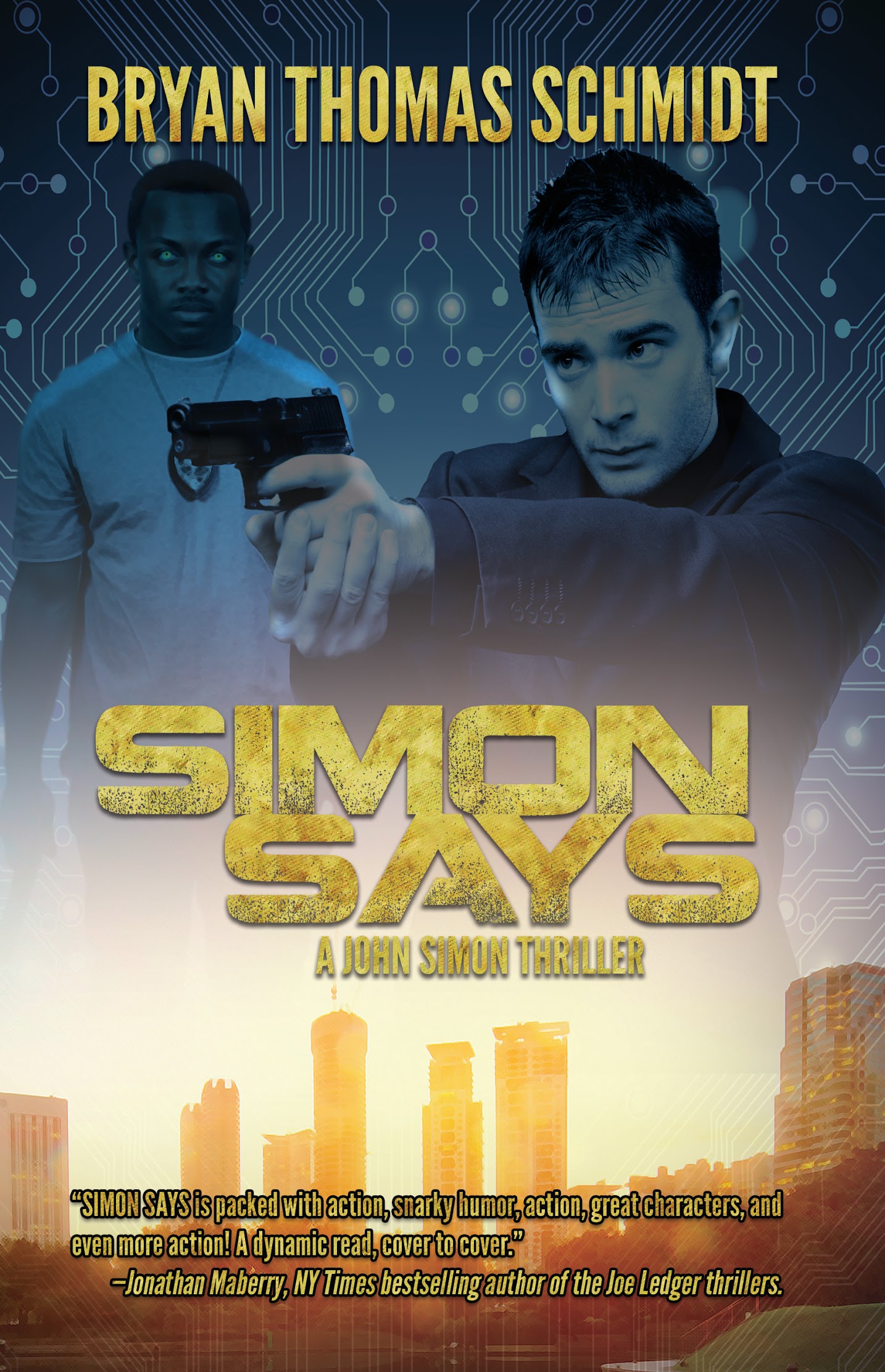 Meanwhile, we plan to publish both speculative fiction and mystery/thriller with a few others possibly mixed in. We hope you’ll check out what we’re doing. Our first release will be Simon Says, the firs in my John Simon thrillers, which is Bosch meets Lethal Weapon with robots. It’s filled with action, strong memorable characters and humor and set in 2029 Kansas City, with a tough Luddite cop teaming with an android witness to solve a nanotech crime and his partner’s kidnapping. Future books will follow.
Meanwhile, we plan to publish both speculative fiction and mystery/thriller with a few others possibly mixed in. We hope you’ll check out what we’re doing. Our first release will be Simon Says, the firs in my John Simon thrillers, which is Bosch meets Lethal Weapon with robots. It’s filled with action, strong memorable characters and humor and set in 2029 Kansas City, with a tough Luddite cop teaming with an android witness to solve a nanotech crime and his partner’s kidnapping. Future books will follow.
As always, launching a small press is a challenging endeavor, but having edited numerous novels and short stories, I hope I am up to the task with a lot of friends for support. Our editorial staff includes Guy Anthony Demarco, an MFA in Creative Writing, who also does our interior design. A.R. Crebs will be our book trailer and cover designer and artist, though we may employ others as time goes on. I also have some proofers and a few others as well.
Be sure and check us out. Simon Says is up for preorder now on Amazon, Barnes and Noble, and wherever books are sold!
https://www.barnesandnoble.com/w/simon-says-bryan-thomas-schmidt/1133948927?ean=9781622257508
WriteTip: The Importance Of Writing Rules As Boundaries For Learning Craft
 Since December of 2010, I’ve been interviewing authors, editors and others almost weekly on craft every Wednesday for SFFWRTCHT, and one of our regular and favorite question is about Best and Worst Writing Advice. It’s always interesting the answers we get. And after hundreds of guests, only a few repeats, it always amazes me how many different answers we get. In fact, sometimes a repeat guest will answer differently each visit.
Since December of 2010, I’ve been interviewing authors, editors and others almost weekly on craft every Wednesday for SFFWRTCHT, and one of our regular and favorite question is about Best and Worst Writing Advice. It’s always interesting the answers we get. And after hundreds of guests, only a few repeats, it always amazes me how many different answers we get. In fact, sometimes a repeat guest will answer differently each visit.
But what surprises me sometimes are the harsh rejections of mainstays writing rules like “avoid passives,” etc. I think sometimes experienced writers reach a point where old rules seem more limiting than helpful, perhaps. But I still find and believe, as an editor and author both, that those rules have an important role to play in most writer’s development and growth with craft.
There’s another old adage in entertainment that applies as much to publishing as Hollywood. It goes like this: “No one knows everything.”
And while it’s true no one knows everything, you do need to know the boundaries before you break them, and writing rules are a great way to learn those.
For example, passives are a weaker form that when employed exclusively or excessively weaken the storytelling and act as telling, not showing. Once you’ve learned how to construct strong sentences, yes, you can use passives effectively, but in the beginning especially, I think learning to write without them is absolutely important and even essential to success.
Another thing about writing rules is that they often outline pet peeves of various people, and some care about one rule more than others. But the value in knowing them is that they tend to help guide you to a stronger path and stronger prose. And they often identify common weaknesses and missteps writers have taken which have hurt their writing, their success, and the appeal of their work not just to publishers but to readers as well. There are differences between writing fiction and nonfiction, between journalism and fiction, and so on. And sometimes fiction rules are helpful if you’re experienced with another form of writing but inexperienced with fiction, as I was.
There’s another adage that gets trotted out too: “Rules are made to be broken.”
You hear people cite writers like Stephen King or Neil Gaiman who have broken rules. And yes, they have and get away with it. But usually they get away with it because the rules are so imbedded into their process that when they stray from them, they do it with such skill that it just works in ways a lesser writer couldn’t manage. You see, knowing the boundaries so well that they become second nature has advantages, and one of those advantages is that you can later deviate outside them a bit without falling off a cliff.
Let me say it again, knowing the boundaries is necessary before you can risk going outside them. And teaching boundaries is what the writing rules so often taught are for.
As a professional editor of both anthologies and novels, I see people violating the rules all day long. Rarely is it on purpose. Most often it’s because they don’t know the rules or understand how to abide by them. And the result is always sloppier, weaker writer, and a less effectively told tale. ALWAYS. I can’t count how many times a day I have to correct over and over the same errors and explain the same rules. It gets tedious. Sometimes it gets annoying. But it’s the job, and it’s made up for by the pleasure and joy I get in seeing the final polished project overcome these weaknesses and really sparkle and shine.
You can’t be expected to just know everything when starting out. And you won’t learn unless someone takes the time to show you, to explain. So part of my role as editor is to do that for you, gently, but firmly. And I try and do it with a sense of humor, too, to hopefully lessen the sting. But I still have to do it, and you still need to learn the rules.
Just because they seem arbitrary doesn’t mean they are. Just because they can be annoying doesn’t mean you can ignore them.
These rules have developed over decades for good reason. And although they evolve as tastes and grammar and publishing house style guides change, most of them have remained relatively the same for a very long time.
So next time you hear or see your writing hero blow off the rules, don’t take it as an invitation to do so yourself. Your journey is not the same as theirs. In fact, your journey is not identical to anyone’s. Learn the rules, practice them until they become instinct and you can recite them by heart. Learn them until you don’t even remember them anymore, you just do it. Because you’ll be a better writer, that’s what their for. And you’ll be more successful and respected.
And once you have that respect, then you can throw caution to the wind and go crazy. But not before.
For what it’s worth…
Bryan Thomas Schmidt is an author and editor of adult and children’s speculative fiction. His debut novel, The Worker Prince (2011) received Honorable Mention on Barnes & Noble Book Club’s Year’s Best Science Fiction Releases for 2011. His short stories have appeared in magazines, anthologies and online. He edited the anthologies Space Battles: Full Throttle Space Tales #6 (2012), Beyond The Sun (2013), Raygun Chronicles: Space Opera For a New Age (2013) and coedited Shattered Shields (Bean, 2014) with Jennifer Brozek and is working on Monster Corp., A Red Day, Mission Tomorrow, andGaslamp Terrors, among others. He hosts #sffwrtcht (Science Fiction & Fantasy Writer’s Chat) Wednesdays at 9 pm ET on Twitter.
Goodbye & Thanks 2012! A Good Year In Review
Well, as many of you know, Fall 2009 through Fall 2011 were some tough times for me. Although it all ended on a high note with the release of The Worker Prince and mention by Barnes and Noble Book Club’s Paul Goat Allen in his Year’s Best Science Fiction Releases of 2011. But 2012 has been a much kinder year. So here are a few of the highlights:
Books Released: 5
Magazines Released: 1
by Bryan Thomas Schmidt (Editor)
 June 2012 (Diminished Media Group)
June 2012 (Diminished Media Group)— Sequel to The Worker Prince, 2nd in the Saga Of Davi Rhii space opera trilogy, a bit of a rough launch and sales are still slow but I feel very proud of the progress in my writing shown here and the story. Blurbed on the cover by Mike Resnick, Paul S. Kemp (Star Wars), and Howard Andrew Jones.
by Bryan Thomas Schmidt, Evan Peter(artist)
 August 2012 (Hadrosaur)
August 2012 (Hadrosaur)— La Migra: my first print magazine short story, third short story I ever wrote, sold in El Paso in early Summer 2011, and set there, it finally made publication.
by David Lee Summers (Editor), Bryan Thomas Schmidt (Author), etc.
 November 2012 (Hall Bros.)
November 2012 (Hall Bros.)— edited by dear friend Jaleta Clegg, a fellow novelist, my first space opera humor piece, third anthology appearance: Duncan Derring & The Call Of The Lady Luck. Some great stories here despite a rough road to publication for us all. Duncan Derring will also appear in Triumph Over Tragedy in January 2013, my first 2nd sale of a short story.
by Jaleta Clegg (Author/Editor), Frances Pauli (Goodreads Author)(Author/Editor), Bryan Thomas Schmidt (Author), etc.
Books Written: 7
102 More Hilarious Dinosaur Jokes For Kids (Delabarre)
The Returning (Saga Of Davi Rhii Book 2) (Diminished Media) – final polish draft
Duneman (Dawning Age Cycle) (TBD) – second and third drafts, epic fantasy
Belsuk The Half Orc 1 (TBD) – partial sword & sorcery
Tommy Falcone 1 (TBD) – partial noir science fiction time travel
Abraham Lincoln Dinosaur Hunter: Land Of Legends (Delabarre) – forthcoming January 2013, my first children’s chapter book, 1st in a series cocreated with Jeff Rutherford
101 Hilarious Science Fiction Jokes (Delabarre) – forthcoming 2013
Books Sold: 3
102 More Hilarious Dinosaur Jokes For Kids (Delabarre)
Abraham Lincoln Dinosaur Hunter: Land Of Legends (Delabarre)
101 Hilarious Science Fiction Jokes (Delabarre)
Short Stories Written:
2 North Star Serial episodes (Sold to Digital Dragon Magazine) scifi
Brasilia with Octavio Aragao (on market) scifi
The Day Bobby Bonner Woke Up Striped (on market) scifi
Anthologies Sold: 3
Beyond The Sun – Kickstarter sold to Fairwood Press, forthcoming July 2013 (Mike Resnick, Nancy Kress, Kristine Kathryn Rusch, Robert Silverberg headliners) – science fiction colonist stories
Raygun Chronicles: Space Opera For A New Age – Kickstarting in January 2013, sold to Every Day Publishing pending funding, for November 2013 release (Mike Resnick, Kristine Kathryn Rusch, A.C. Crispin, Dean Wesley Smith, Seanan McGuire, Robin Wayne Bailey, Sarah A. Hoyt, Allen Steele, Brenda Cooper headlining) – space opera new and reprint in pulp style
Shattered Shields – coedited with Jennifer Brozek, sold to a major publisher (cannot announce who until contract final) for Summer 2014 release (Larry Correia, Elizabeth Moon, Catherine Asaro, David Farland, Glen Cook, Seanan McGuire, Sarah A. Hoyt headlining) [first SFWA qualifying sale]
A very productive and awesome year which also saw me start earning significant income from editing in the Fall, with 3 anthologies sold and 5 more in the works, including collaborations with John Helfers, Rich Horton and Maurice Broaddus. I also joined White Cat Publications to edit Blue Shift Magazine, a new semi-pro science fiction zine which debuts in May 2013, but which I did most of the buying for in November 2012. I finally finished the epic fantasy novel started in January 2010 and will be querying agents with hopes of my first major publishing novel deal. I survived my first full year back in Kansas, attended my first World Con, moderated my first World Con panel, appeared on my first World Con panels, and attended 5 Conventions and 6 signings. Also, The Worker Prince earned out its advance and went into profit in October.
So, it’s been a pretty fun and exciting year. And 2013 is already headed toward being even more exciting, with 3 books expected to release, 2 anthologies, and hopefully a few more short story and anthology sales. I also hope to write 2-3 novels and 2-3 children’s books, land agents for both adult and children’s and become a full SFWA member. Maybe I’ll even start dating again or something wild and crazy like that. Ha! Who has the time? Let’s not go off the deep end, now!
Thanks all for the interest and support.
Write Tip: 7 Things You Should Never Do After Getting Revision Notes From An Editor
 Getting a personal response on a story you’ve submitted from an editor is a big deal for most writers. At least those of us in the early years of our career. To have gotten a personal response at all puts you in the elite. After all, writers spend years getting form rejections and some never get over the hurdle to a personal response. It means your story was good enough to get past slush readers or first readers to the editor themselves. And it means that it impressed them enough–i.e. you impressed them enough–they felt you deserved the respect of a personal reply. When that reply is not a rejection but a request for revisions and invitation to resubmit that’s even better. It’s okay to be excited. It’s okay to be terrified. Such events rightly provoke both. But before you respond, you should think carefully about your next move. Here’s some things I’ve learned as both editor and in discussion with other editors and writers that you shouldn’t do:
Getting a personal response on a story you’ve submitted from an editor is a big deal for most writers. At least those of us in the early years of our career. To have gotten a personal response at all puts you in the elite. After all, writers spend years getting form rejections and some never get over the hurdle to a personal response. It means your story was good enough to get past slush readers or first readers to the editor themselves. And it means that it impressed them enough–i.e. you impressed them enough–they felt you deserved the respect of a personal reply. When that reply is not a rejection but a request for revisions and invitation to resubmit that’s even better. It’s okay to be excited. It’s okay to be terrified. Such events rightly provoke both. But before you respond, you should think carefully about your next move. Here’s some things I’ve learned as both editor and in discussion with other editors and writers that you shouldn’t do:
1) Tell People You Have A Story Sale – You don’t have a sale until you get a contract, or, at the very least, a note from the editor saying he or she wants to buy the story. So don’t jump the gun. It can not only be embarrassing but it’s unprofessional. Do it more than once, not only will your friends not take you seriously when you tell them the next time, but fellow pros may not take you seriously in other contexts as well. It’s okay to be excited. It’s okay to tell people you got a personal note. But represent it for what it is and don’t jump the gun.
2 ) Send Back a Rant – This may seem obvious but writers often have a range of reactions to story notes. Sometimes, especially when the notes are simple, they’re pleased and relieved. Changes can be made quickly and easily, with no stress and hardly any effort, and the story sent back. But other times, and usually this is the case when an editor asks you to revise and resubmit, there may be substantial changes requested. Some may even seem to take your story in a different direction than you’d planned. Some may make you think the editor missed what you were trying to do. If the changes are unclear, contacting the editor is okay, but never in anger. Even if you think the editor’s stupid or wrong, that’s information best kept between yourself, your mother, your lover and your pets. Don’t discuss it on Twitter or Facebook. Don’t mention the editor by name if you don’t have to. Keep it to a small, close circle. Sharing that with anyone else is bad news, especially the editor and other pros. It will never bring good results. It can only bring trouble. Save the Rant. Trust me.
3)Rewrite From Scratch – Sometimes the changes are overwhelming, either because they require a lot of work or restructuring, even a completely rewritten section, perhaps, or because you don’t know how to do them. Once you get past the “OMG, a professional editor liked my story enough to write back personally” phase and the “OMG I’m on the verg of a sale” phase, stop and think. By all means, reread the story carefully to see what’s asked for. Jot down notes if ideas come to you on some of the changes. By all means make the changes that seem obvious and simple. If an idea comes to you for the more complicated ones that seems to get it where the editor wants you to go, make it. But the one thing you shouldn’t do is start over from scratch. Undoubtedly the notes will ask for changes. But along with that, they likely mention things the editor liked. If they didn’t see potential for a sale, you’d have just gotten a rejection, after all. So be sure you preserve what they liked about the story while fixing what they don’t. I had a writer almost rewrite himself out of an anthology I was editing because he took his story back with my notes and trashed half of what I loved about it in a complete rewrite. This was a friend. And it was my first anthology as editor, so I called him and we discussed it. With a few more changes, I bought it anyway, but most editors would just pass. They don’t have the time or personal interest to put in that effort, so don’t over complicate it for yourself.
4) Bombard The Editor With Endless Questions – It’s okay to ask for clarifications if there’s something you don’t understand when an editor sends notes. It’s also okay if word changes are asked that you’re not comfortable with to explain the original choice and then ask if you can keep it. Editors send lots of changes. Not all of them are deal breakers. They know which ones they are but they might not spell it out. Wait until you’re reread the story and reviewed all the notes. Make the changes you’re comfortable with right away before contacting the editor. Then ask the rest in a clear manner, one at a time, noting page, etc. Don’t call the editor unless they invited you to do so. Do this by email or letter, depending on how they contacted you. Editors get lots of phone calls and have lots of obligations. Calling uninvited is a bit like demanding attention right now. Unless you’re a regular contributor or friend to the editor, you don’t want to send that message yet. And if you get to three emails with such questions all initiated by you, don’t hit send. Instead, stop and find someone else to bounce it off of. Trust me. Unless the editor shows clear interest and willingness to make time for ongoing discussion, you risk making yourself a pest or coming off as needy and difficult. Neither will endear you to the editor. They may pass on not only your story but you.
5) Rush Through The Tweaks Asked For Without Careful Reread And Consideration Of How They Affect The Rest – If an editor has taken the time to send notes and encourage you to resubmit, they’ve probably read your story more than once. They’ve given careful thought to what you’re trying to accomplish, how it fits with what they’re trying to accomplish and how best to get you there. But they’ve also likely read the story more recently than you have. Don’t send in revisions without a complete, careful reread of your story. Do not skim. Sit down when you can relax and consider every word. The last thing you want is a hasty rewrite that messes up other elements of the story. Make sure it’s right before you resubmit every time.
6 ) Send The Story To Another Market And Ignore The Editor – You should always respond to the editor with at least a short “thank you.” Even if you decide the changes requested are not something you’re comfortable with. It is your story, after all. It’s okay to thank them for their interest and the kind time they took to read the story and offer notes. You can tell them you’d prefer to send the story as is to other markets first. But be sure and let them know one way or the other whether they can expect it. Especially with anthologies, the editor may be holding other stories to wait and see yours. They have deadlines, too. Trust, it’s very frustrating as an editor to be waiting for a resubmission that never comes. Be Professional. Communicate. If you don’t and they later see it somewhere else, you have made a bad impression it’ll be hard to shake.
7) Throw The Story In the Circular File – This one I always thought was obvious but I’ve learned it’s not. Just because the story was not perfect does not make it a failure. Throwing out stories in haste is a fool’s game. It’s wasting potential. Even if you don’t want to make the requested changes, maybe another editor will like it. After all, if your story made it past the slush and first readers to the editor him/herself, then that’s saying something. If they made time to personally respond, that’s saying something else: they respect your talent and like your story. Even if they don’t accept it, this is not the time to give up on it. Get what you can from their notes and get it back out there. The next editor may buy it on the spot.
Okay, there’s 7 Write Tips For What Not To Do After Getting Revision Notes From An Editor. Love to hear comments if you have any more. Meanwhile, hope this is helpful. For what it’s worth…
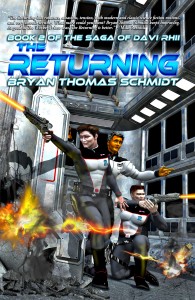 Bryan Thomas Schmidt is an author and editor of adult and children’s speculative fiction. His debut novel, The Worker Prince (2011) received Honorable Mention on Barnes & Noble Book Club’s Year’s Best Science Fiction Releases for 2011. A sequel The Returning followed in 2012 and The Exodus will appear in 2013, completing the space opera Saga Of Davi Rhii. His first children’s books, 102 More Hilarious Dinosaur Books For Kids (ebook only) and Abraham Lincoln: Dinosaur Hunter- Lost In A Land Of Legends (forthcoming) appeared from Delabarre Publishing in 2012. His short stories have appeared in magazines, anthologies and online. He edited the anthology Space Battles: Full Throttle Space Tales #6 (2012). He hosts #sffwrtcht (Science Fiction & Fantasy Writer’s Chat) Wednesdays at 9 pm ET on Twitter and is an affiliate member of the SFWA.
Bryan Thomas Schmidt is an author and editor of adult and children’s speculative fiction. His debut novel, The Worker Prince (2011) received Honorable Mention on Barnes & Noble Book Club’s Year’s Best Science Fiction Releases for 2011. A sequel The Returning followed in 2012 and The Exodus will appear in 2013, completing the space opera Saga Of Davi Rhii. His first children’s books, 102 More Hilarious Dinosaur Books For Kids (ebook only) and Abraham Lincoln: Dinosaur Hunter- Lost In A Land Of Legends (forthcoming) appeared from Delabarre Publishing in 2012. His short stories have appeared in magazines, anthologies and online. He edited the anthology Space Battles: Full Throttle Space Tales #6 (2012). He hosts #sffwrtcht (Science Fiction & Fantasy Writer’s Chat) Wednesdays at 9 pm ET on Twitter and is an affiliate member of the SFWA.
Write Tip: Things Pros Wish New Authors Knew About Publishing And Don’t
 This started out to be a top 10 list. You know the saying: “Advice is like buttholes, everybody’s got one.” And when it comes to writing, advice is like sand on a beach: everywhere. But sifting the sand to separate the pure from the soiled can be tricky. Authors seeking publication approach pros all the time seeking help, opportunity, pitching their novels and stories. And often the difference between positive and negative response lies in the professionalism of the author who’s asking. The more informed you are about the business, the better position you’re in to approach people and sell yourself. But all too many still get it wrong.
This started out to be a top 10 list. You know the saying: “Advice is like buttholes, everybody’s got one.” And when it comes to writing, advice is like sand on a beach: everywhere. But sifting the sand to separate the pure from the soiled can be tricky. Authors seeking publication approach pros all the time seeking help, opportunity, pitching their novels and stories. And often the difference between positive and negative response lies in the professionalism of the author who’s asking. The more informed you are about the business, the better position you’re in to approach people and sell yourself. But all too many still get it wrong.
Then I asked professional authors, editors and publishers I know what advice they wish new authors knew about publishing but don’t and got such diverse and great responses, I didn’t need to write a post, so here they are broken down by category and source. I hope you find them helpful. Although the people I asked are from the Science Fiction and Fantasy end of publishing because those are my circles, most of this advice applies to writers regardless of genre.
According to Publishers:
Jason Sizemore, Publisher of Apex says:
1) Asking me to sign a pledge or promise or contract stating I won’t steal their idea. You might be surprised to know this happens once in awhile.
2) Responding to edits in an unprofessional manner. I’m one of the easiest editors in the business to get along with, so I get doubly annoyed when an author gets snotty about suggested edits. Just tell me what you disagree with and let’s have a professional conversation about them. There is a good chance I will side with the author.
3) Being impatient. Publishing is the proto-typical “hurry up and wait” profession. If that is an aspect of the business you can’t deal with, then you’re probably in the wrong business.
Brian Hades, Publisher of Edge Books, says:
1) Publishers are human.
2) Publishers are dedicated.
3) Publishers have deadlines.
4) Publisherrs have a vision of the future.
5) Publishers want to be your partner.
6) Publisher’s are not on-demand printers.
7) Publishers have submission guidelines for a reason.
8) Publishers do not have spare time.
9) Publishers want your success as much as they want their own.
10) Publishers have a business plan, and think you have one too.
Grace Bridges, Editor and Publisher of Splashdown Books says:
Relationships are the single most important factor in getting published, once you have a good story. Be professional, be polite, don’t be a jerk, but don’t suck up either. Be real, and connect.
According to Editors:
Cat Rambo, freelance editor and author and the former editor of Fantasy Magazine, she’s dealt with a lot of authors selling stories. Here’s what she wishes more of them knew:
Rejections are never personal.
Ellen Datlow, an award-winning editor of magazines an anthologies like Omni and Years Best Fantasy & Horror says:
In the internet age: never email an editor a manuscript before querying them first to make sure it’s all right to do so–neither as an attached file or in the body of an email.
Phil Athans is an author and editor who has worked with Forgotten Realms, Dungeons & Dragons and more. His book The Guide to Writing Fantasy and Science Fiction: 6 Steps to Writing and Publishing Your Bestseller! is filled with great tips for genre writers. He offered one tip:
Do it for anything but the money.
Everyone’s heard all the rags-to-riches stories behind franchise authors like J.K. Rowling and Stephen King, but those stories are actually extremely rare. Most published authors continue to hold down a “day job” in order to afford luxury items like food, electricity, and health care. Publication is not a guarantee of riches, especially in the current Depression, which has hit the publishing business particularly hard. If you’re depending on selling your book in the next couple weeks to make your next mortgage payment you’re in serious trouble. It could take a year or more for your book to be accepted by a publisher, and another couple years after that before it actually hits the bookstore shelves. And by then, any trend you might be trying to surf has long-since passed, so don’t try to write a Hunger Games knock-off. By the time you’re done writing it, the Hunger Games thing will be over. Write because you love to tell stories and have a story of your own you’re dying to tell. That’s how you might become “the next J.K. Rowling.” In fact, that’s precisely how J.K. Rowling did it. Be patient, be prepared to work hard, and do not quit your day job!
According to Authors:
Grandmaster James Gunn is the author of numerous short stories and novels, including The Listeners and The Immortals. He’s also a Professor at University of Kansas where he leads the Center For The Study Of Science Fiction, Ad Astra magazine, and the John W. Campbell Conference and Awards, amongst other things. He says:
I like Fred Pohl’s advice: Everything in a contract is negotiable except the name of the publisher, and even that can be negotiated if the book is wanted enough.
CJ Cherryh is a John W. Campbell, Nebula and Hugo winning author of books like Downbelow Station and Cyteen:
a) nowadays publishing houses want e-rights. They will hold their breath until they get them. If it is a big house able to do them well, this is ok.
b) never sell anybody rights that their company is not large enough or diverse enough to use. Sequester those rights from the contract. IE, you can have ‘first’ ‘North American’ ‘serial rights’ (for a story) or you can have’role-playing’ ‘gaming rights’ or you can have ‘board’ ‘gaming rights’ or you may have the ‘audio reproduction’ rights but not the ‘audio drama’ rights and not ‘audiovisual’ rights or ‘stage production rights’ or ‘motion picture’ rights. It should also say ‘all rights not assigned in this contract belong to the author’.
c) always include something like the following: ‘publication of the Work as an e-book shall not be considered publication as defined in’ [the paragraph where it specifies the kind of print publication and says what the Work is and defines the term ‘in print’.] if it is only for e-publication, be sure to include this: “When in any calendar year the proceeds from e-book sales do not exceed 300.00, all rights shall revert to the author.’ At least it’ll make them cough up enough to buy you a shopping trip.
d) be real damned careful about your shalls and wills when you are writing a contract term. Use of the wrong one can void the clause. Get a lawyer friend to glance over it.
e) terms in book contracts don’t mean the same that they do in any other kind of contract. I have had lawyers who have book contracts come to me, who am not a lawyer, to look over for stingers and problems. ‘Royalty’ is in an application unique to the publishing world, and does not mean royalties in any sense understood by the IRS. Remember this.
f) be real damned sure that in case you or your publisher should be hit by a bus, there is a provision for successors in the contract. A book is property. It can be passed to your heirs. A publishing house is a corporation: it can die, or be sold, and if it is sold, its contracts can be part of the sale. That’s why there’s an ‘heirs and successors’ clause in contracts. This prevents you having to hunt down the dogs to get performance and means they have to deal with your heirs.
g) there should be a performance clause, ie, they have x number of months to get this Work on the stands or published.
h) copyright should always be in the author’s name. Insist.
Bestselling urban fantasy author Kat Richardson (Greywalker) offered this advice:
For me the things that are most irritating are the electronic book clauses and the many forms they can take; in one of my contracts it’s under Electronic Rights and in another from the same publisher, it’s under Display Rights.
Also, be very careful of the agency clauses in the contracts as they define the writer’s relationship with the agency, even though that’s actually none of the publisher’s business, but they can effect the writer to the same or greater degree as the actual agency contract or agreement.
Faith Hunter is a bestselling author of the Jane Yellowrock and Rogue Mage novels, amongst others, and member of the blog team Magical Words and said:
Finish and polish the book *before* you try to find an agent or editor.
Dave Gross writes for computer games by day and fantasy novels by night. His next Pathfinder Tales novel, Queen of Thorns, arrives in mid-October. He offers this advice:
The only universally useful writing advice is: Write. Write often, and write in different ways. Don’t be afraid of imitation. Copy the writers you admire, then rewrite those pieces in a different style. Do that a lot, and then set it aside. Come back to it later and write it in your own voice. Write different genres of story. Write poems. Write plays. Try writing at different times. Write in the morning. Take a nap and when you get up start writing. Write after everyone else has gone to bed. Write in different places and with different tools. Write on the bus or in the park. Write in the middle of a food court. If you use a computer, write in a notebook. Try using a pencil instead of a pen. Write the minute after you get out of a movie while your head is still filled with strange images. Write down your dreams. Imagine the dream someone is having in the house down the street, and write that. Write plenty, and rewrite even more. Maybe you won’t see the difference in a matter of weeks or months, but eventually you will see it. When you do, write about it.
International bestselling author Daniel Abraham has over a dozen books in print and has been short-listed for Hugo, Nebula and World Fantasy Awards. He offers this advice:
Career implosions are normal. Almost everyone who’s been in the business for more than a few years has had their career founder under them at least once. The people who got discouraged are the ones that aren’t around anymore. The folks who stayed are the ones that shrugged off the failures and started trying to break in again. And again. And again
Maurice Broaddus, urban fantasy author (The Knights Of Breton Court) and anthology editor (Dark Faith, Dark Faith 2) suggests:
Guard as many of your rights as possible (the publisher doesn’t need all of them).
Bestselling author Jean Johnson who rights paranormal romance and military science fiction (An Officer’s Duty, A Soldier’s Duty, The Sword, The Cat, The Mage) says:
Spelling, punctuation, grammar, and formatting actually do still count.
Slush pile readers, agents, and editors will discard stories filled with errors, inconsistancies, and a blatant lack of care for the craft of the written word. Even if your name is Stephen King, they will be looking at the manuscript for how good it is as a story, and how well crafted it is as a piece of writing. It may seem unfair, but if they see a lot of technical errors in the way words are spelled, how sentences are structured and punctuated, so on and so forth, they’re not going to want to give you a publishing contract because they will not believe you are professional enough to handle the demands of a contract.
In fact, most literary agencies and publishing houses have a standard “X number of errors in Y number of pages = toss it in the rejection pile” policy. Whether it’s a written, official policy or not, they have too many other manuscripts to wade through to waste time on something that makes their eyes cross and their brains hurt.. Yes, you may have written a story, and you can be proud of that. Yes, you may believe that it’s a good story, good enough to be published, and there’s nothing wrong with believing in yourself and your work. However, that does not entitle you to carelessness, arrogance, or anything else which would suggest an unprofessional attitude. This includes an unprofessional presentation of your written works.
There are points where you can stand up for the formatting you want, or the spelling of a specific word, particularly in genre fiction, but understand that most editors and publishers will want your novel to look its best in the eyes of your future readers. Cooperate beforehand by getting your manuscript beta-edited by someone with good literary skills. Cooperate during the review and editing process by carefully considering the changes suggested. Strive diligently to look for and eliminate errors during the copy-editing and draft-editing stages.
Cultivate and cherish a reputation for producing clean manuscripts as well as the good stories we know you have inside of you. Editors, agents, and especially your future readers will love you for it.
 Bryan Thomas Schmidt is an author and editor of adult and children’s speculative fiction. His debut novel, The Worker Prince(2011) received Honorable Mention on Barnes & Noble Book Club’s Year’s Best Science Fiction Releases for 2011. A sequel The Returning followed in 2012 and The Exodus will appear in 2013, completing the space opera Saga Of Davi Rhii. His first children’s books, 102 More Hilarious Dinosaur Books For Kids (ebook only) and Abraham Lincoln: Dinosaur Hunter- Lost In A Land Of Legends (forthcoming) appeared from Delabarre Publishing in 2012. His short stories have appeared in magazines, anthologies and online. He edited the anthology Space Battles: Full Throttle Space Tales #6 (2012) and is working on World Encounters and Space & Shadows: SpecNoir with coeditor John Helfers, both forthcoming. He hosts #sffwrtcht (Science Fiction & Fantasy Writer’s Chat) Wednesdays at 9 pm ET on Twitter and is an affiliate member of the SFWA.
Bryan Thomas Schmidt is an author and editor of adult and children’s speculative fiction. His debut novel, The Worker Prince(2011) received Honorable Mention on Barnes & Noble Book Club’s Year’s Best Science Fiction Releases for 2011. A sequel The Returning followed in 2012 and The Exodus will appear in 2013, completing the space opera Saga Of Davi Rhii. His first children’s books, 102 More Hilarious Dinosaur Books For Kids (ebook only) and Abraham Lincoln: Dinosaur Hunter- Lost In A Land Of Legends (forthcoming) appeared from Delabarre Publishing in 2012. His short stories have appeared in magazines, anthologies and online. He edited the anthology Space Battles: Full Throttle Space Tales #6 (2012) and is working on World Encounters and Space & Shadows: SpecNoir with coeditor John Helfers, both forthcoming. He hosts #sffwrtcht (Science Fiction & Fantasy Writer’s Chat) Wednesdays at 9 pm ET on Twitter and is an affiliate member of the SFWA.
WorldCon Recap, Part 2–A Family Reunion & Coming Of Age
In yesterday’s recap, part 1, I talked about the things I did during WorldCon. Today’s post may interest no one but myself, yet since I found WorldCon to be profoundly moving on several levels as an experience, I still want to talk about that aspect as well. In many ways, for me, ChiCon 7 fell somewhere between a coming of age and a family reunion. It was a business trip, too, yes, but felt instead more like a gathering of family and old friends, reunited to celebrate their commonalities and enjoy their common passions, and, in my view, that’s exactly what a good con should be.
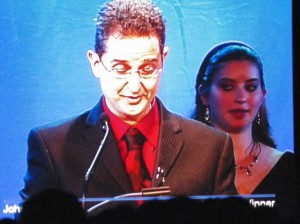 Part of this was the result of having peers who are up and coming alongside me or just a step ahead nominated for Hugos. It’s hard to measure who’s at what level, I suppose, and these are people with whom I have struck up close friendships. But watching guys like John DeNardo and Brad R. Torgersen and Patrick Hester be nominated for awards was personally moving. Regardless of that fact that one won and two lost, it was like an endorsement that our generation is welcome to the party, and I shared a sense of pride with them and achievement in that, though I had little to with Brad and Patrick’s work (I do regularly contribute to SFSignal).
Part of this was the result of having peers who are up and coming alongside me or just a step ahead nominated for Hugos. It’s hard to measure who’s at what level, I suppose, and these are people with whom I have struck up close friendships. But watching guys like John DeNardo and Brad R. Torgersen and Patrick Hester be nominated for awards was personally moving. Regardless of that fact that one won and two lost, it was like an endorsement that our generation is welcome to the party, and I shared a sense of pride with them and achievement in that, though I had little to with Brad and Patrick’s work (I do regularly contribute to SFSignal).
Another part was having writers whose names I recognized but whom I’d never interacted with telling me they recognized my name and knew of my chat, etc. It was affirming to know that I’m more established than I realized and the respect given made me feel like I’d transitioned to one of the gang rather than a fandboy/wannabe/outside looking over the windowsill. Oh sure, standing next to Robert J. Sawyer and Robert Silverberg and such was a bit fanboy-inducing and probably always will be. Both have suggested I call them by their first names now and my internal voice keeps saying: “I don’t know if I can.” But they were both incredibly friendly and kind and it’s an honor to count them peers and friends.
It was also really exciting to be treated as an equal on panels with the likes of Charles Stross, Jay Lake, and Nancy Kress. For newcomers Lissa Price and myself, it could have been intimidating to share a panel with them, but I was assigned to moderate and all three treated me as if I were an equal. Nancy and Jay even went out of their way to compliment my efforts, which was quite kind. Full disclosure, Jay and I had lunch before the panel and have struck up a friendship over several years despite this being our first face-to-face encounter. And I have bought a story tentatively from Nancy for an anthology. But the next panel with Kay Kenyon and Carol Berg went much the same. And it was a feeling extended throughout encounters with 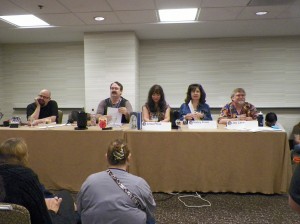 numerous luminaries in the field.
numerous luminaries in the field.
There’s a voice inside most authors, I think, that constantly suggest we’re not good enough, not worthy. That calling ourselves an author alongside those greats we admire is far too presumptuous, perhaps, or that we have to earn our way a bit more first. For me, while I consider humility both healthy, advisable and a sign of maturity, it still is nice to feel accepted as a peer by such people. And it’s an honor I hope to live up to so they never come to regret it, if that makes any sense. It felt like I came of age from fan/wannabe to full on member of the club, as a result, and that was emotionally rewarding after some very hard months and years on a personal and professional level.
I was also honored and quite pleased when artist and ASFA president Mitchell Bentley won one of eight Judge’s Choice Awards at the World Con Art Show from judges including Irene Gallo for his cover of “Rivalry On A Sky Course,” my Davi Rhii prequel story. I commissioned it on a very thin budget and gave him a percentage of books sold in exchange. He’d done beautiful covers for the books, and I wanted to maintain the look of the series. Plus, I enjoy collaborating with Mitch a lot. I am so pleased for him at the recognition for his fine work and,  on top of that, for the fact that the Judges recognized its quality and the Con Chair bought the piece, rewarding him in yet another way. Congrats to Mitch! And gratitude!
on top of that, for the fact that the Judges recognized its quality and the Con Chair bought the piece, rewarding him in yet another way. Congrats to Mitch! And gratitude!
Were there disappointments at WorldCon? Being ignored by a couple of people I once called friends for some unknown offense was a bit offputting, yes. So was missing connections with some people I really wanted to meet and never seem to encounter at Cons. The Hugo after parties shutting out of friends from the celebration annoyed me. And there were some lines and priceyness issues from time to time. I also wish my book sales had been a bit better. Three books out of 60 was a smaller ratio than I would have liked.
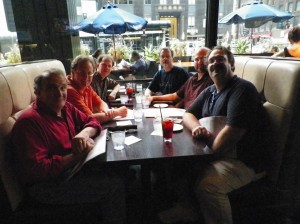 But those complaints are overshadowed by the magic I experienced with all the wonderful people I met. Truly it was like Schmidt Family Reunions we hold every three years that I’ve attended in that past. Meeting online friends like Jamie Todd Rubin, Howard Andrew Jones, James Enge, Madison Woods, Tim Ward, Brad Torgersen, Annie Bellett, Jay Lake, Cat Rambo, Barb Galler-Smith, Matt Forbeck and more for the first time and reuniting with old friends I hadn’t seen in a while like Saladin Ahmed, Mike Resnick, John O’Neill, Chris Kastenschmidt, and more. Add to that meeting so many past #sffwrtcht guests, including luminaries like Silverberg and Sawyer, and it was a really good experience for networking and family building. Howard Andrew Jones and I commiserated tonight on FB about how much we’d bonded with people online, making face-to-face encounters rather natural and not awkward. It’s amazing what social media has created for networking and relationship building.
But those complaints are overshadowed by the magic I experienced with all the wonderful people I met. Truly it was like Schmidt Family Reunions we hold every three years that I’ve attended in that past. Meeting online friends like Jamie Todd Rubin, Howard Andrew Jones, James Enge, Madison Woods, Tim Ward, Brad Torgersen, Annie Bellett, Jay Lake, Cat Rambo, Barb Galler-Smith, Matt Forbeck and more for the first time and reuniting with old friends I hadn’t seen in a while like Saladin Ahmed, Mike Resnick, John O’Neill, Chris Kastenschmidt, and more. Add to that meeting so many past #sffwrtcht guests, including luminaries like Silverberg and Sawyer, and it was a really good experience for networking and family building. Howard Andrew Jones and I commiserated tonight on FB about how much we’d bonded with people online, making face-to-face encounters rather natural and not awkward. It’s amazing what social media has created for networking and relationship building.
And then I arrived home riding the waves of these emotions and highs and found these waiting for me:
Yeah, I know, “you got mail”– big deal, right? BUT the Locus contains a mention and my name’s on the cover of Talisman. Because Locus mentions my new book, The Returning, and my 3rd short story ever, written in 2009-10 then revised and sold in 2011, finally made it to print in Tales Of The Talisman, becoming my first print magazine appearance as a fiction author. It also is my first illustrated short story, not counting the cover for “Rivalry On A Sky Course’s” ebook, of course. “LaMigra’s” alien monster comes to life. Based on my time in El Paso, it’s the story of a culture clash that happens when two Mexican illegals get taken by aliens they mistake for Border Patrol. As each side reacts differently than expected, it’s a fun examination of setting and culture on the border. But I’m biased as the writer, of course.
It’s a good feeling to achieve yet two more successes on the heels of a great Con. How was your World Con?
 Bryan Thomas Schmidt is an author and editor of adult and children’s speculative fiction. His debut novel, The Worker Prince(2011) received Honorable Mention on Barnes & Noble Book Club’s Year’s Best Science Fiction Releases for 2011. A sequel The Returning followed in 2012 and The Exodus will appear in 2013, completing the space opera Saga Of Davi Rhii. His first children’s books, 102 More Hilarious Dinosaur Books For Kids (ebook only) and Abraham Lincoln: Dinosaur Hunter- Lost In A Land Of Legends (forthcoming) appeared from Delabarre Publishing in 2012. His short stories have appeared in magazines, anthologies and online. He edited the anthology Space Battles: Full Throttle Space Tales #6 (2012) and is working on World Encounters and Space & Shadows: SpecNoir with coeditor John Helfers, both forthcoming. Beyond The Sun and Spec Sports anthologies are also in the works. He hosts #sffwrtcht (Science Fiction & Fantasy Writer’s Chat) Wednesdays at 9 pm ET on Twitter and is an affiliate member of the SFWA.
Bryan Thomas Schmidt is an author and editor of adult and children’s speculative fiction. His debut novel, The Worker Prince(2011) received Honorable Mention on Barnes & Noble Book Club’s Year’s Best Science Fiction Releases for 2011. A sequel The Returning followed in 2012 and The Exodus will appear in 2013, completing the space opera Saga Of Davi Rhii. His first children’s books, 102 More Hilarious Dinosaur Books For Kids (ebook only) and Abraham Lincoln: Dinosaur Hunter- Lost In A Land Of Legends (forthcoming) appeared from Delabarre Publishing in 2012. His short stories have appeared in magazines, anthologies and online. He edited the anthology Space Battles: Full Throttle Space Tales #6 (2012) and is working on World Encounters and Space & Shadows: SpecNoir with coeditor John Helfers, both forthcoming. Beyond The Sun and Spec Sports anthologies are also in the works. He hosts #sffwrtcht (Science Fiction & Fantasy Writer’s Chat) Wednesdays at 9 pm ET on Twitter and is an affiliate member of the SFWA.
The Exodus at Halfway (Progress Report)
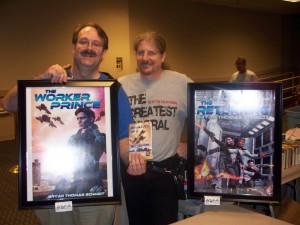
[progpress title=”The Exodus (Saga Of Davi Rhii 3)” goal=”120000″ current=”59000″]
Almost halfway, as hard as that may be to believe for a novel I started July 3oth. So that’s my word count for 24 days. The best streak I’ve ever had since I started writing fiction, I believe.
As I’ve tweeted daily word count reports, I’ve gotten lots of questions about it, so I thought it might be good to analyze a bit about writing a final trilogy book and why sometimes that has advantages for speed.
One thing to note is that so much worldbuilding is done already. I’m working with elements that are well developed which really saves a bunch of time. I have to describe them again and try and flesh out details we haven’t seen before but I don’t have to reinvent the wheel. Additionally, the character arcs and plotlines flow out of the cliffhanger in Book 2, so the basic starting points were fairly well defined. And as such, progressing from them to the wrap up is a narrower course than I worked with before on the prior books.
But another aspect of this is that I have written The Returning, Duneman, a half Belsuk novel, a half time travel novel, numerous short stories, and two children’s books in the interim between The Worker Prince and The Exodus, seen the release of two novels, a children’s book and some shorts and gotten lots of feedback and interviewed lots of writers. The lessons I learned from all those experiences have been internalized in large part, becoming part of my craft and writing process, so inevitably that will affect both my effectiveness as a writer and my speed. I certainly hope that shows. Watching other writers like Sam Sykes through the course of a trilogy and seeing how they developed and grew has been an interesting process and it’s one I hope my readers will take note of as well.
 It’s important to admit that no book is perfect and looking back, as an author, one can always see many things one might change in retrospect. Sometimes the temptation to do it is overwhelming. If an omnibus of Saga Of Davi Rhii ever happens, I will fix some POV stuff and typos from the final book of Worker Prince but I don’t know how much else I’d touch. It is what it is and it represents who I was at a certain time as a writer. Paul Goat Allen’s recognition of the book for B&N also makes me think that while it’s flawed, it’s still something I can be proud of in spite of those flaws and there’s something about preserving that, flaws and all, that feels sacred to me. Maybe 20 years from now with many more books under my belt, I’ll laugh at this post. Who knows? But I’m in a place where that’s not happening right now.
It’s important to admit that no book is perfect and looking back, as an author, one can always see many things one might change in retrospect. Sometimes the temptation to do it is overwhelming. If an omnibus of Saga Of Davi Rhii ever happens, I will fix some POV stuff and typos from the final book of Worker Prince but I don’t know how much else I’d touch. It is what it is and it represents who I was at a certain time as a writer. Paul Goat Allen’s recognition of the book for B&N also makes me think that while it’s flawed, it’s still something I can be proud of in spite of those flaws and there’s something about preserving that, flaws and all, that feels sacred to me. Maybe 20 years from now with many more books under my belt, I’ll laugh at this post. Who knows? But I’m in a place where that’s not happening right now.
But another factor in all of this is life. Although I’m still in a financial and employment crisis after two years of unemployment with benefits run out, my marriage is over and I am not dealing with the stress of that nor my ex’s health issues. I’m still grieving and healing, of course, but the stress of that period was such that it really impacted my focus and writing in ways that have only recently begun to be fully grasped. I am also in a quieter place with less distractions and family around to support. I’ve been to a lot of Cons and bonding with my SFF community at large (at least many of them–a few roughs spots of late). And I’ve had that success from the novel and anthology releases that has spurred me onward plus encouragement from the many people supporting SFFWRTCHT and this blog, especially Write Tips. So those are things which subconsciously and consciously both add to the mix and spur me onward.
Whatever the case, The Exodus is fast headed for 120000 words and I’m glad. I still have a month or so to finish but if I pull it off, despite a brief break for World Con next week, then it will be a new record for me. I’ll finish it, go back to rewrite Abraham Lincoln: Dinosaur Hunter 1 and Duneman and Abe will be off to press while I look for an agent for the fantasy trilogy. I also have three anthologies in the works as editor and some exciting book editing developments as a freelance editor in the works as well.
Since October 2011, I’ve had two novels, an anthology, an ebook, a children’s book, and four short stories come out. That’s an incredible year by anyone’ s standards, I’d suspect. 2013 will have The Exodus and hopefully two or three Abe Lincoln kid’s books, possibly 2 more ebook joke books, and maybe even the epic fantasy. Some anthologies are also in the works. I’m very grateful for the support and interest and for the opportunities.
For what it’s worth…
 Bryan Thomas Schmidt is an author and editor of adult and children’s speculative fiction. His debut novel, The Worker Prince(2011) received Honorable Mention on Barnes & Noble Book Club’s Year’s Best Science Fiction Releases for 2011. A sequel The Returning followed in 2012 and The Exodus will appear in 2013, completing the space opera Saga Of Davi Rhii. His first children’s books, 102 More Hilarious Dinosaur Books For Kids (ebook only) and Abraham Lincoln: Dinosaur Hunter- Lost In A Land Of Legends (forthcoming) appeared from Delabarre Publishing in 2012. His short stories have appeared in magazines, anthologies and online. He edited the anthology Space Battles: Full Throttle Space Tales #6 (2012) and is working on World Encounters and Space & Shadows: SpecNoir with coeditor John Helfers, both forthcoming. He hosts #sffwrtcht (Science Fiction & Fantasy Writer’s Chat) Wednesdays at 9 pm ET on Twitter and is an affiliate member of the SFWA.
Bryan Thomas Schmidt is an author and editor of adult and children’s speculative fiction. His debut novel, The Worker Prince(2011) received Honorable Mention on Barnes & Noble Book Club’s Year’s Best Science Fiction Releases for 2011. A sequel The Returning followed in 2012 and The Exodus will appear in 2013, completing the space opera Saga Of Davi Rhii. His first children’s books, 102 More Hilarious Dinosaur Books For Kids (ebook only) and Abraham Lincoln: Dinosaur Hunter- Lost In A Land Of Legends (forthcoming) appeared from Delabarre Publishing in 2012. His short stories have appeared in magazines, anthologies and online. He edited the anthology Space Battles: Full Throttle Space Tales #6 (2012) and is working on World Encounters and Space & Shadows: SpecNoir with coeditor John Helfers, both forthcoming. He hosts #sffwrtcht (Science Fiction & Fantasy Writer’s Chat) Wednesdays at 9 pm ET on Twitter and is an affiliate member of the SFWA.
The Returning Blog Tour Schedule
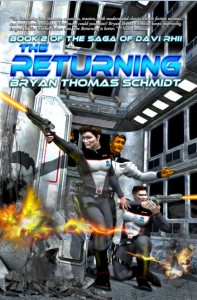 It’s hard to believe it’s here. I get all emotional because of all the behind the scenes chaos I went through while writing it, but I’m about to be the author of two published novels and I’m thrilled and humbled at the same time. So you know what that means: another blog tour. Just last October, I was off promoting the novel I’d longed to write for 27 years, The Worker Prince. Now, it finally has a sequel, The Returning. It’s got another brilliant Mitch Bentley cover. More of the action and multi-layered plotting, larger-than-life characters and humor mixed with drama. It’s even got blurbs by three of my favorite writers, now also my friends.
It’s hard to believe it’s here. I get all emotional because of all the behind the scenes chaos I went through while writing it, but I’m about to be the author of two published novels and I’m thrilled and humbled at the same time. So you know what that means: another blog tour. Just last October, I was off promoting the novel I’d longed to write for 27 years, The Worker Prince. Now, it finally has a sequel, The Returning. It’s got another brilliant Mitch Bentley cover. More of the action and multi-layered plotting, larger-than-life characters and humor mixed with drama. It’s even got blurbs by three of my favorite writers, now also my friends.
It has everything, and you can find out for yourselves on June 19th! But right now, here’s the scoop on the tour and how you can preorder signed paperbacks or ebooks at 25% off on my store or at Barnes & Noble here.
The Vertullians are free and have full citizenship but that doesn’t mean they’re accepted. Someone is sending assassins to kill and terrorize them, riling up the old enmity all over again, while Xalivar is back seeking revenge on Davi and all those who defied him. Davi, Farien and Yao reunite to investigate the murders, finding their lives and friendships threatened by what they discover. Meanwhile, the new High Lord Councilor, Tarkanius, Lord Aron, and Davi find themselves fighting all over again to preserve the unity of the Borali Alliance, while even many of their allies and friends work against them to tear it apart. Davi and Tela find their future together threatened by difficulties with their relationship, and Miri’s adjusting to her new status as a non-royal. The action packed, emotional, exciting Davi Rhii story continues.
370 pp · ISBN 978-0-9840209-4-2 ·Trade Paperback · $14.99 tpb $5.99 Ebook · Publication: June 19, 2012
“The Returning has romance, assassins, tension, both modern and classic science fiction notions, and very smooth writing. What more could you want? Bryan Thomas Schmidt keeps improving. As good as THE WORKER PRINCE WAS, THE RETURNING is better.” – Mike Resnick, Author, Starship, Ivory
“The Returning blends themes of faith with classic space opera tropes and the result is a page-turning story that takes off like a rocket.” – Paul S. Kemp, Author, Star Wars: Riptide, Star Wars: Deceived
“A fun space opera romp, complete with intrigues, treachery, dastardly villains, and flawed but moral heroes.” Howard Andrew Jones (Pathfinder: Plague Of Shadows, The Desert Of Souls) on THE RETURNING
To preorder your signed paperback for $11 + shipping, click here:
To preorder the ebook in whichever format you prefer, click here: (be sure and enter format desired in the box)
To preorder from Barnes & Noble, click here: http://www.barnesandnoble.com/w/the-returning-bryan-thomas-schmidt/1108892375?ean=9780984020942![]()
And please visit these awesome blogs for more information including excerpts, interviews, guest posts and more all through June and July 2012!![]() I’ll insert links as they become available as well as updating specific content which is still being determined.
I’ll insert links as they become available as well as updating specific content which is still being determined.
THE RETURNING Blog Tour
Tuesday, May 29 Blog Tour Schedule & Book Release – www.bryanthomasschmidt.net/blog (You’re there now)
Wednesday, May 30 Functional Nerds Guest Post: Tools For Worldbuilding (Guest Post)
Thursday, May 31 Anthony Cardno Guest Post: How To Run a Blog Tour For A Sequel Without Spoiling Book 1
Friday, June 1 Gary W. Olson Character Profile & Excerpt: Xalivar
Monday, June 4 SFSignal Guest Post: 15 Science Fiction and Fantasy Thrillers Worth Your Time
Tuesday, June 5 Andrew Reeves/Jaded Muse Video Blog: Boxes (What’s yours?)
Wednesday, June 6 Reader’s Realm Excerpt from Chapter 2/ Brad R. Torgersen Catching Up With Interview
Thursday, June 7 Linda Rodriguez Guest Post: 5 Tips On Social Media For Today’s Author
Friday, June 8 Linda Poitevin Guest Post: Approaching Book 2
Monday, June 11 Elizabeth S. Craig: Mystery Writing Is Murder, Special Write Tip Guest Post: Surprise v. Suspense / Review at Functional Nerds
Tuesday, June 12 Matthew Sanborn Smith/The One Thousand: Character Profile & Excerpt: Farien Noa
Wednesday, June 13 Leah Petersen 5 Minute Interview
Thursday, June 14 Mae Empson Character Profile Interview & Excerpt: Tela Tabansi
Friday, June 15 Joshua P. Simon Interview
Monday, June 18 Bibliophile Stalker Guest Post: Culture In World-building
Tuesday, June 19 Mary Pax Dialogue: Why I Love Space Opera / Book Day Post
Wednesday, June 20 Moses Siregar Guest Post: What Makes A Story Epic
Thursday, June 21 Jaleta Clegg Guest Post: Food in Borali System
Friday, June 22 To Be Read Interview & EBook Giveaway
Sunday, June 24 THE PLATFORM Internet Radio with John Rakestraw “Finding Your Imagination“
Monday, June 25 Grasping For The Wind Turning The Tables: SFFWRTCHT Interviews Bryan Thomas Schmidt
Tuesday, June 26 Ray Gun Revival Short Interview & Character Profile & Excerpt: Yao Brahma
Wednesday, June 27 AISFP Blog Essay: The Importance of The Responsible Use Of History In Fiction: Steampunk/Jamie Todd Rubin Dialogue: Space Battles In The Golden Age & Beyond
Thursday, June 28 Oops! Glitch! Post postponed to tomorrow due to unexpected travel of host blogger.
Friday, June 29 K.D. Weiland Guest Post: The Most Important Rule Of Writing: Be True To Yourself
Saturday, June 30 Patty Jansen Guest Post: Can There Be Space Opera Without Science?
Monday July 2 FMW Podcast Interview (delayed due to editing issue)
Tuesday July 3 Book Day 2: Print Release!!!
The Blog Tour Resumes Friday, July 6, after the holiday with more fun!!!!
And if you missed the prior book’s blog tour, here’s that roundup.
I also did posts in my popular Write Tips series on Planning A Blog Tour and Preparing For A Blog Tour Even As You Write.
For specific info on this series, The Saga of Davi Rhii, click here.
For this book’s page, click here.
For The Worker Prince page, click here.
 To order my debut novel, THE WORKER PRINCE, Book 1 in the Saga Of Davi Rhii, use the links at the bottom:
To order my debut novel, THE WORKER PRINCE, Book 1 in the Saga Of Davi Rhii, use the links at the bottom:
What if everything you thought you knew about yourself and the world turned out to be wrong?
For Davi Rhii, Prince of the Boralian people, that nightmare has become a reality. Freshly graduated from the prestigious Borali Military Academy, now he’s discovered he was secretly adopted and born a worker. Ancient enemies of the Boralians, enslaved now for generations, the workers of Vertullis live lives harder than Davi had ever imagined. To make matters worse, Davi’s discovered that the High Lord Councillor of the Alliance, his uncle Xalivar, is responsible for years of abuse and suppression against the workers Davi now knows as his own people.His quest to rediscover himself brings him into conflict with Xalivar and his friends and family, calling into question his cultural values and assumptions, and putting in jeopardy all he’s worked for his whole life. Davi’s never felt more confused and alone. Will he stand and watch the workers face continued mistreatment or turn his back on his loved ones and fight for what’s right? Whatever he decides is sure to change his life forever.
326 pp · ISBN 978‐0‐9840209‐0‐4 ·Trade Paperback · $14.95 tpb $4.99 Ebook · Publication: October 4, 2011
Or you can order at Amazon here: The Worker Prince![]()
 Bryan Thomas Schmidt is the author of the space opera novels The Worker Prince, a Barnes & Noble Book Clubs Year’s Best SF Releases of 2011 Honorable Mention, andThe Returning, the collection The North Star Serial, Part 1, and has several short stories featured in anthologies and magazines. He edited the new anthology Space Battles: Full Throttle Space Tales #6 for Flying Pen Press, headlined by Mike Resnick. His children’s book 102 More Hilarious Dinosaur Jokes For Kids from Delabarre Publishing. As a freelance editor, he’s edited a novels and nonfiction. He’s also the host of Science Fiction and Fantasy Writer’s Chat every Wednesday at 9 pm EST on Twitter, where he interviews people like Mike Resnick, AC Crispin, Kevin J. Anderson and Kristine Kathryn Rusch. A frequent contributor to Adventures In SF Publishing, Grasping For The Wind and SFSignal, he can be found online as @BryanThomasS on Twitter or via his website. Bryan is an affiliate member of the SFWA.
Bryan Thomas Schmidt is the author of the space opera novels The Worker Prince, a Barnes & Noble Book Clubs Year’s Best SF Releases of 2011 Honorable Mention, andThe Returning, the collection The North Star Serial, Part 1, and has several short stories featured in anthologies and magazines. He edited the new anthology Space Battles: Full Throttle Space Tales #6 for Flying Pen Press, headlined by Mike Resnick. His children’s book 102 More Hilarious Dinosaur Jokes For Kids from Delabarre Publishing. As a freelance editor, he’s edited a novels and nonfiction. He’s also the host of Science Fiction and Fantasy Writer’s Chat every Wednesday at 9 pm EST on Twitter, where he interviews people like Mike Resnick, AC Crispin, Kevin J. Anderson and Kristine Kathryn Rusch. A frequent contributor to Adventures In SF Publishing, Grasping For The Wind and SFSignal, he can be found online as @BryanThomasS on Twitter or via his website. Bryan is an affiliate member of the SFWA.
The Importance Of Reaching Beyond Female Stereotypes
My friend and fellow editor Kat Heckenbach asked an interesting question on Facebook today which really got me thinking about stereotypes: Are authors obligated to make characters fall into certain stereotypes because readers expect it? (For example, most people think of Goths as angry, snarly, dark, and Poe-obsessed. But when referring to a little kid, they can and do use the word cute–but if a Goth character in a book said that, would it just throw you right out?)
Stereotypes are common in literature, there’s no doubt, and in Science Fiction and Fantasy this can be particularly the case, especially with female characters. Damsels in distress are a mainstay of our genres, both inside the stories/books and on the covers. Most of us have seen Jim C. Hines’ posts about the silliness of the way women are posed versus men in such art. These images feed the stereotypes. Yes, they are an attempt by publishers to sell books using sex, which has worked forever as a means of moving product, not just books. But what message do they send culturally to women, young women and, almost more importantly, men, about the roles women have to play in our society? Are they just objects for lustful stares and wet dreams? Do these images leave open the possibility for far more substance below the surface? How silly do male characters look when dressed and posed like female characters typically are? Take a look at this imagining or Avengers with such poses.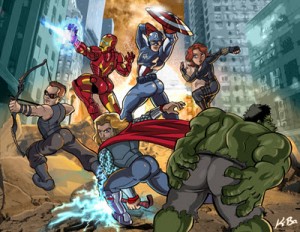
Think I’m kidding? Take a look at two cover examples below. One is an older example, the other more recent. Do artists and publishers actually think anyone could fight dressed this way or would? It kind of questions the character’s intelligence, doesn’t it? To make it worse, in the case of Ringo’s book, the publisher site describes the character as “soccer mom and demon fighter.” Wow. A soccer mom who walked around in that outfit would be accused of indecency, wouldn’t she? Not to mention being shunned by fellow soccer moms.
For me there’s no question that bucking stereotypes is far more interesting and adds nuances. If you start out with the typical housewife who raises kids while the hubby works but then turns out to be a zombie fighting badass, how much more interesting did she just get? I think, in particular, with women characters, fantasy struggles with this. The traditional epic fantasy has strong, sweaty fighting men protecting their helpless women, but is it really that interesting anymore? And can’t we change our views of women enough to include more possibilities? Even history would demonstrate that women have played far more diverse roles than the stereotypes a male-dominated society describes them with. There has been at least one female Pope, for example, whose gender was only discovered after she became pregnant. That was hundreds of years ago and she had to conceal her identity. But this is a different age. Why should women have to hide their true selves? I’d like to think we’re more enlightened than that, but I know not all of us are.
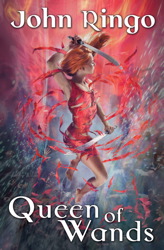 I grew up with strong women around me. From my Mom, who was the stay at home housewife, a woman who retired from nursing to raise her three kids, to my twin sister, cousins, aunts, and grandmothers, the women I grew up with were not stereotypical. They had common traits we might associate with women, of course. They were often more emotional than men and could talk about it more freely. Most of them were better at cooking and laundry, etc. than we men. But this was not because we were incapable of it, rather it was because that was the role they were expected to take on. They took it on gladly, too, but my Mom sat me down at fourteen with a stern warning. “You’re going to learn to cook, clean, do laundry, basic sewing, and anything else I think you need so your wife can’t send you back some day and tell me you’re not finished.” And so I did learn, and those skills have been invaluable to me. In fact, when I got married, my wife didn’t know how to sew, so I was the one who fixed buttons, dog toys, etc. in our house. I also helped with cleaning. In fact, there were some tasks I really don’t enjoy which are typically associated with men—lawn work, for example—which my wife enjoyed and did while I helped with so-called “women’s work.”
I grew up with strong women around me. From my Mom, who was the stay at home housewife, a woman who retired from nursing to raise her three kids, to my twin sister, cousins, aunts, and grandmothers, the women I grew up with were not stereotypical. They had common traits we might associate with women, of course. They were often more emotional than men and could talk about it more freely. Most of them were better at cooking and laundry, etc. than we men. But this was not because we were incapable of it, rather it was because that was the role they were expected to take on. They took it on gladly, too, but my Mom sat me down at fourteen with a stern warning. “You’re going to learn to cook, clean, do laundry, basic sewing, and anything else I think you need so your wife can’t send you back some day and tell me you’re not finished.” And so I did learn, and those skills have been invaluable to me. In fact, when I got married, my wife didn’t know how to sew, so I was the one who fixed buttons, dog toys, etc. in our house. I also helped with cleaning. In fact, there were some tasks I really don’t enjoy which are typically associated with men—lawn work, for example—which my wife enjoyed and did while I helped with so-called “women’s work.”
There’s a ridiculous term if I’ve ever heard one: “women’s work.” The work typically grouped under that heading is the work necessary to daily living. If you’re a bachelor, unless you’re rich, you’re going to have to do laundry, find a way to cook and eat, etc. It doesn’t make you suddenly sprout breasts and start generating estrogen. “Women’s work” is an insulting term because its origins come from a sense of superiority by men that the “important work” is not for women. Because, of course, raising good, responsible citizens while the men are at the office working sixty hour weeks is unimportant. Keeping a nice home so the man can come home and actually relax during down time is menial. We’d all survive without those things, right? Yep, without “women’s work” we’d still be the greatest country on Earth.
Hardly. Some of the most meaningful character-building times in my life were working with my mother and grandmothers on the very tasks typically called “women’s work”—learning to cook, fold clothes, sew, etc. I’m a creative after all, and cooking and sewing, in particular, very much stimulate my creative impulses. Add to that the fact that walking around naked outside of performance art has tended to be frowned upon, especially if your ribs are showing like a starving African kid, and, well, they really did me a service teaching me to care for clothes and feed myself. I’m just saying…
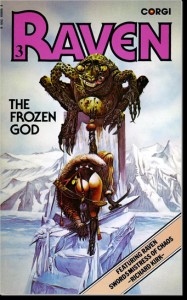 And look at this cover for Raven 3: The Frozen God. Seriously. A woman dressed like that fighting monsters on an ice field? Oh yeah, that’s realistic. Yeah, this warrior woman is so badass, she doesn’t even freeze. Yep. The only time women in my life ever dressed this way was to go swimming, at Halloween of costume parties, or in changing rooms at the store. In fact, other than my wife, none of the women mentioned from my life in this post ever dressed this skimpily. It’s not even appropriate for the task. Unless, as my editor suggested, the only way to kill this monster is to get it aroused. Doubtful.
And look at this cover for Raven 3: The Frozen God. Seriously. A woman dressed like that fighting monsters on an ice field? Oh yeah, that’s realistic. Yeah, this warrior woman is so badass, she doesn’t even freeze. Yep. The only time women in my life ever dressed this way was to go swimming, at Halloween of costume parties, or in changing rooms at the store. In fact, other than my wife, none of the women mentioned from my life in this post ever dressed this skimpily. It’s not even appropriate for the task. Unless, as my editor suggested, the only way to kill this monster is to get it aroused. Doubtful.
You just can’t stereotype women any more than you can men these days. The fact is that we are all individuals and just when you meet a women whom you think embodies all the “typical female traits,” five minutes later she’ll surprise you with aspects you never would have imagined. It used to be “men’s work” to get an education and write, for example, and where would our genres be without Ursula LeGuin, Connie Willis, Kristine Kathryn Rusch, A.C. Crispin, Leigh Brackett, C.L. Moore, and numerous others? How much would be have missed out on if the Cat Valentes, Kij Johnsons, Nnedi Okorafors, and N.K. Jemisons had never put pen to paper? Seriously. What about Ellen Datlow and Paula Guran, Beth Meacham and Liz Gorinsky, Anne Vandermeer and Sheila Williams? They buy stories from men as well as women and all are amongst the top editors in this business.
I get the whole male instinct to want to protect their women. But it’s not like those instincts don’t also exist in women. Think I’m wrong? Go to a playground and act weird around some woman’s kid. Be sure and take a picture of that black eye and get a copy of the mug shot, too, okay?
I think it’s incumbent upon all writers, male and female, to carefully consider the roles they give to characters. Yes, with minor roles, sometimes stereotypes can be expedient. And sometimes they get the job done, but push yourself to make sure that for every stereotype you employ ten characters who buck such narrow definitions. Not only will your plots and themes and work expand in scope and meaning as a necessary result, but it will resonate more profoundly with modern readers and even help erase stereotypes as functions of our culture. I can think of no greater goal and contribution Science Fiction and Fantasy writers could make, can you?
The world needs more ninjas posing as suburban housewives who save the world. It needs more mothers who don’t wait for their husbands to save the day but draw their sword or blaster and take on the kidnappers themselves, kicking ass to free their kids. Our modern world has plenty of room for men in the kitchen and sewing, too. After all, think of Top Chef and other cooking shows: Emeril Lagasse, Wolfgang Puck, Curtis Stone, Gordon Ramsey, Calvin Klein, Bob Mackie, and Guccio Gucci—should these men be considered abnormal for the excellence they’ve worked hard to create? Hardly.
As much as I applaud them for having this panel, it’s 2012. Should we really still desperately need panels like this:
(PR) Kicking ass in high heels: These days women can kick ass, save the world, and still have time to fall in love.
But why are they still doing it in hot pants and high heels? Can heroines be a size 18 and still be beautiful?
Unfortunately, we do need them, and it’s because of the perpetuation of stereotypes. Think of the other issues we could be putting our time into if we just put aside these silly limitations and moved on?
One of the worst insults I got in a review was a review which said I had “shockingly outdated female roles.” This was for a story where I have female political leaders, female starfighter pilots, female warriors, female military leaders, and so on. I thought I was trying hard to break the molds, and yet here comes a reviewer to tell me I hadn’t done enough. I still think they’re wrong, but, at the same time, it pushes me to strive harder, to ask more questions, and to do everything I can to prove them wrong so I never hear such a disappointing criticism again. After all, my Mom reads my books. I don’t want her thinking I didn’t learn a thing from all her efforts. But more than that, I don’t want my daughters and other girls who read my books to ever think I’m telling them they can’t be anything they want to be.
The world may set limits, but in the worlds of your fiction, possibilities are limitless. Don’t let yourself write within the familiar box of the world in which you live. Instead, tear down the walls and shoot for something no one’s seen but should be seeing. Push the boundaries and see where it takes you, your characters and your story. Let no one accuse us of writing the same old fantasy or space opera. Instead, let us together launch a new age and work to redefine what “same old” is. To my mind, we owe it to our wives, mothers, sisters and daughters to open the world’s doors. After all, making the world a better place is a responsibility for all of us, not just a “chosen male few.” We live in an age when the distinction between what women can do for careers and what men can do is fading to almost nothing. How can our fiction represent our times and a bright future if it doesn’t reflect that?
For what it’s worth…
 Bryan Thomas Schmidt is the author of the space opera novels The Worker Prince, a Barnes & Noble Book Clubs Year’s Best SF Releases of 2011 Honorable Mention, andThe Returning, the collection The North Star Serial, Part 1, and has several short stories featured in anthologies and magazines. He edited the new anthology Space Battles: Full Throttle Space Tales #6 for Flying Pen Press, headlined by Mike Resnick. His children’s book 102 More Hilarious Dinosaur Jokes For Kids from Delabarre Publishing. As a freelance editor, he’s edited a novels and nonfiction. He’s also the host of Science Fiction and Fantasy Writer’s Chat every Wednesday at 9 pm EST on Twitter, where he interviews people like Mike Resnick, AC Crispin, Kevin J. Anderson and Kristine Kathryn Rusch. A frequent contributor to Adventures In SF Publishing, Grasping For The Wind and SFSignal, he can be found online as @BryanThomasS on Twitter or via his website. Bryan is an affiliate member of the SFWA.
Bryan Thomas Schmidt is the author of the space opera novels The Worker Prince, a Barnes & Noble Book Clubs Year’s Best SF Releases of 2011 Honorable Mention, andThe Returning, the collection The North Star Serial, Part 1, and has several short stories featured in anthologies and magazines. He edited the new anthology Space Battles: Full Throttle Space Tales #6 for Flying Pen Press, headlined by Mike Resnick. His children’s book 102 More Hilarious Dinosaur Jokes For Kids from Delabarre Publishing. As a freelance editor, he’s edited a novels and nonfiction. He’s also the host of Science Fiction and Fantasy Writer’s Chat every Wednesday at 9 pm EST on Twitter, where he interviews people like Mike Resnick, AC Crispin, Kevin J. Anderson and Kristine Kathryn Rusch. A frequent contributor to Adventures In SF Publishing, Grasping For The Wind and SFSignal, he can be found online as @BryanThomasS on Twitter or via his website. Bryan is an affiliate member of the SFWA.







